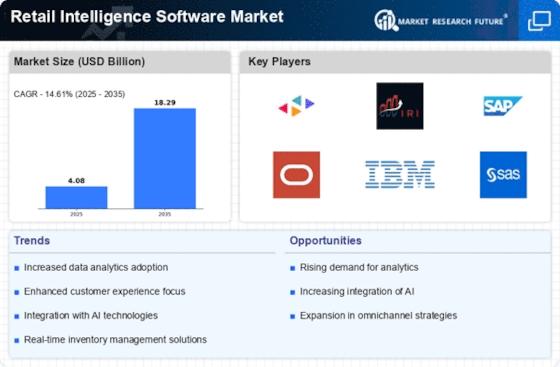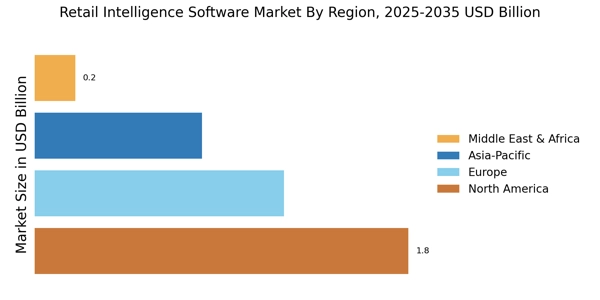Need for Inventory Optimization
The need for inventory optimization is a significant driver in the Retail Intelligence Software Market. Retailers are facing challenges related to excess inventory and stockouts, which can adversely affect profitability. Data suggests that retailers lose approximately 20% of sales due to stockouts, highlighting the critical need for effective inventory management solutions. Retail intelligence software enables businesses to analyze sales patterns, forecast demand, and optimize stock levels. By leveraging these insights, retailers can reduce costs associated with overstocking and improve customer satisfaction by ensuring product availability. This focus on inventory optimization is likely to propel growth in the Retail Intelligence Software Market.
Increased Focus on Sustainability
An increased focus on sustainability is emerging as a vital driver in the Retail Intelligence Software Market. Consumers are becoming more environmentally conscious, prompting retailers to adopt sustainable practices. Data indicates that 60% of consumers prefer to shop with brands that demonstrate a commitment to sustainability. Retail intelligence software can assist retailers in tracking their supply chain practices, ensuring compliance with sustainability standards, and optimizing resource usage. As businesses strive to align with consumer values and regulatory requirements, the integration of sustainability-focused solutions is expected to gain traction in the Retail Intelligence Software Market.
Integration of Advanced Analytics
The integration of advanced analytics into retail operations is a key driver in the Retail Intelligence Software Market. Retailers are increasingly leveraging data analytics to gain actionable insights into sales trends, inventory management, and customer behavior. The market for analytics software is projected to grow significantly, with estimates suggesting a compound annual growth rate of over 25% in the coming years. This growth indicates a robust demand for solutions that can process large volumes of data and provide real-time insights. As retailers seek to optimize their operations and enhance decision-making processes, the adoption of advanced analytics tools is expected to play a crucial role in shaping the Retail Intelligence Software Market.
Rise of E-commerce and Digital Transformation
The rise of e-commerce and ongoing digital transformation are pivotal factors influencing the Retail Intelligence Software Market. As more consumers shift to online shopping, retailers are compelled to adapt their strategies to meet evolving consumer expectations. Data indicates that e-commerce sales have surged, accounting for nearly 20% of total retail sales. This shift necessitates the implementation of retail intelligence solutions that can analyze online consumer behavior, optimize pricing strategies, and manage inventory effectively. Retailers are increasingly investing in software that provides insights into online shopping trends, thereby enhancing their competitive edge in the Retail Intelligence Software Market.
Growing Demand for Enhanced Customer Experience
The Retail Intelligence Software Market is witnessing a growing demand for enhanced customer experience. Retailers are increasingly recognizing the importance of understanding consumer behavior and preferences. This shift is driven by the need to create personalized shopping experiences that foster customer loyalty. According to recent data, 70% of consumers expect personalized interactions from retailers. Consequently, businesses are investing in retail intelligence solutions that provide insights into customer preferences, enabling them to tailor their offerings effectively. This trend is likely to continue as retailers strive to differentiate themselves in a competitive landscape, making customer experience a pivotal focus in the Retail Intelligence Software Market.

















